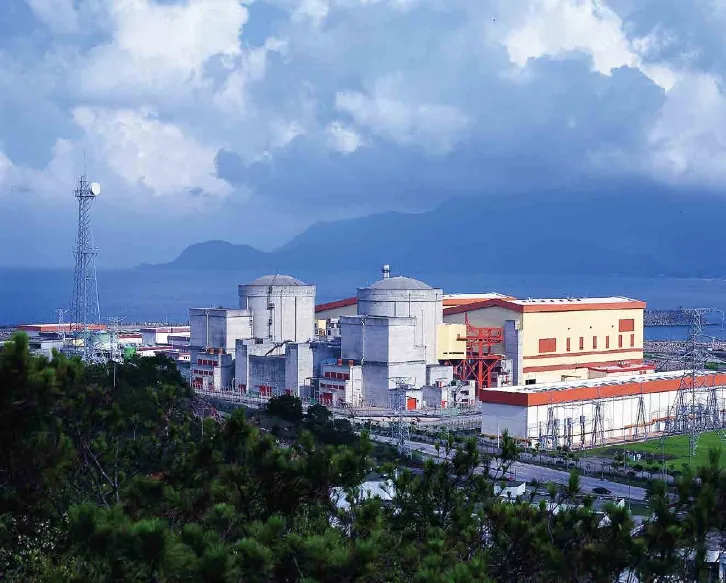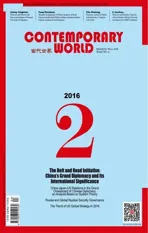Building a Global Nuclear Security Order and Role of China
2016-11-23HAnHUA
HAn HUA
Associate Professor,School of International Studies,Peking University
Building a Global Nuclear Security Order and Role of China
HAn HUA
Associate Professor,School of International Studies,Peking University
China, a country with rapid economic development, increasingly vigorous demand for energy and gradually uplifting environment consciousness, is making great efforts to develop nuclear power. It is planned to accomplish an installed capacity of 40,000MW nuclear power by 2020, so that the nuclear power will account for 4% of the total installed capacity of China's power generation. As a result, China is faced with the challenge of nuclear security with the nuclear power plants already existed, under construction and still in planning over many provinces together with its military nuclear facilities. Moreover, as a member state of the UN Security Council and a rising major power in Asia,China shoulders due responsibilities in safeguarding international and regional security and stability, and China's policy and position on nuclear security exert a significant influence on the building of regional and even global nuclear security order. As a matter of fact, China is playing a constructive and indispensable role in the area of nuclear security.
PARTIEs AT STAkE In GLoBAL NUcLEAR SEcURITY ORDER
The “9-11” attack testified that terrorism has become one of the major threats to the mankind. More and more countries have realized the risks and danger of nuclear weapons in the hands of the terrorist groups. Although there is still controversy over the seriousness of the threat brought about by nuclear terrorism, nobody denies the possibility of the “dirty bombs” with nuclear radiation made with the nuclear materials acquired by terrorist groups. Moreover, severe nuclear terrorist incidents will surely result in catastrophes. Therefore, the international community has adopted a series of measures in the past decade to strengthen the international cooperation on the control and management of nuclear fission materials and various radioactive materials, including the “Global Partnership against the Proliferation of Weapons and Materials of Mass Destruction” and the“Global Initiative to Combat Nuclear Terrorism”, etc..
Proposed by President Obama, the Global Nuclear Security Summit has been convened for three times since 2010, and the topics for discussion have been developed from reaching consensus to implementation and specific measures. At the first Summit in Washington DC in 2010, the participating states emphasized in the Communiqué that “nuclear terrorism is one of the most challenging threats to international security” and all states sharing the “objective” of nuclear security shall adopt “actions” to carry out “sustained and effective international cooperation”. As the sponsor of the Nuclear Security Summit, the US pays close attention to the possibility of “possessing of the weapons of mass destruction by adversary states and terrorists”, and regards it as “one of the biggest security challenge” faced by the US.
China has experienced a process of “self protection” to “cooperation for prevention” on the nuclear security issue. China has attached great importance to nuclear security for a long time, and has been precautious by setting up a whole set of tight and scientific control instruments, which have helped to maintain good records in security of nuclear facilities. However, the rise of both domestic and international terrorism as well as the rapid increase of nuclear power stations in recent years have made China realize the significance and urgency of protecting the nuclear power stations from hostile attacks and preventing the stealing of the nuclear materials. At the same time, since the terrorist actions show a tendency of being cross-regional and international with their illegal nuclear activities covering more than one country, China can no longer keep itself out of the matter. The newly emerging nuclear states and larger nuclear material stockpiles in China's neighbouring coun-tries have made China's security interrelated with the safety of the nuclear facilities and materials in its neighbouring countries. As a nuclear state recognized in the Nuclear Non-proliferation Treaty as well as a developing major power, China has every responsibility to make its due contribution to the building of the global nuclear security order. Thus the Chinese Government is working closely with other states in a proactive manner to tackle nuclear terrorism.

China attaches high importance to nuclear security. It has built a rigorous and well-informed supervision system and keeps a sound record about the protection and security of the nuclear facilities. The picture features the Daya Bay Nuclear Power Station.
PRoPosER oF InTERnATIonAL NUcLEAR SEcURITY ConcEPT
China has always held an active attitude towards the international cooperation in nuclear security. It has participated in the past three Nuclear Security Summits and has put forward its own nuclear security concept, which was reflected in several “equal emphases”, namely “equal emphasis on development and security”, “equal emphasis on rights and obligations”, “equal emphasis on independent and collaborative efforts” and “equal emphasis on treating symptoms and addressing causes”. These “equal emphases”show China's concerns together with the importance it attaches to nuclear security.
First, China takes care of the security matter within the framework of development. As the biggest developing country in the world, China speaks for the basic interests of the economic development in developing countries (including the utilization of nuclear power for national development). It could not ignore security for emphasizing speed of development, nor could it sacrifice development for stressing security.
Second, all states are on different stages of development and at different levels of developing nuclear power, so they adopt different measures and means for safeguarding nuclear security. As a result, all states shoulder different obligations and enjoy different rights in international cooperation for nuclear security. Each state may have its own nuclear securitypolicy in adopting specific measures to prevent its nuclear facilities from being attacked by terrorists or to keep its nuclear materials away from terrorist groups.
Third, as the leading actor in formulating and implementing nuclear security policies, the government shoulders the principal responsibility of the nuclear security in a state. The international cooperation,although very necessary, should be based on willingness. Nobody or no state should injure the development and security of another state in the name of cooperation.
Fourth, we should not only pay attention to some specific security vulnerabilities or weak management mechanism, but also identify the in-depth causes of international terrorism and nuclear proliferation. Only by doing so can we build a general environment and culture of nuclear security. The systematic and comprehensive concept of nuclear security proposed by China on the one hand stands for China's voice,and on the other hand represents the reasonable concerns and appeals for interest of a number of states,in particular the developing countries.
A REsPonsIBLE MAJoR PoWER In NUcLEAR SEcURITY CooPERATIon
Concerning the nuclear security matter, China has not only put forward its own concepts and principles,but also playing its role as a responsible major power by adopting specific measures to implement the proposals for nuclear security raised within the UN framework and at the three Nuclear Security Summit. China has been making efforts for global nuclear security in the following three aspects:
Firstly, China has enhanced its own nuclear security safeguarding and governance. As the world second largest economy and the fastest growing country in nuclear power, China's own nuclear security constitutes a contribution to the international community. China is devoting to the re-identification of nuclear security, the establishment of new security and technical standards, setting up of supporting legislation,publicizing knowledge of preventing and tackling nuclear terrorist attacks to the general public, upgrading testing technologies on nuclear materials and collecting of nuclear information. In January 2016,China issued a white paper entitled China's Nuclear Emergency Preparedness, which gives a complete elaboration of China's ideas, practices, achievements and challenges in nuclear security.
Secondly, China has worked actively with other major powers in building the framework of nuclear security governance. When meeting with President Obama at the Hague Nuclear Security Summit in 2014, President Xi Jinping expressed the willingness of working together in building a system of nuclear security governance with cohesiveness. He also offered to provide the states in need with financial and technical support. In fact, China has already pledged financial support to international nuclear security agency, and promised to help the states in need in carrying out transformation of the high density uranium research reactors for improving nuclear security. Furthermore, with the concerted efforts of China and the US, the China-US Nuclear Security Center was built in Beijing in 2014, which will serve as the base of nuclear security training and technological exchanges for China and the region.
Thirdly, China has been playing a leading role in regional nuclear security cooperation. In recent years, China has played an even more positive role in regional nuclear security cooperation, particularly in northeast Asia. Since the Fukushima nuclear accident,a China-Japan-ROK nuclear power security mechanism has been set up under China's proposal, which has provided safety margin for uplifting the nuclear power development in northeast Asia. In addition,China has paid close attention to Japan's plutonium stockpiles in super-large scale and its newly planning nuclear material project. China also gives support to the agreement reached between the US and Japan during the Hague Nuclear Security Summit that Japan would return the weapon-class plutonium material to the US. On the North Korea Nuclear Issue,China has clarified its tough stance against North Korea's development of nuclear weapons, and has made due diplomatic efforts in this regard. For China,North Korea's repeated nuclear and ballistic missile tests as well as increase of nuclear materials may all bring about disastrous impact on the situation of northeast Asia.
All in all, the tragic incident of the Japanese Fukushima nuclear power plants has shaken some countries' resolution to develop nuclear power, yet the development of nuclear power is still on the rise in Asia. At the same time, the international terrorism has shown a tendency of being cross-regional and internationalized. All the changes make people pay close attention to nuclear terrorism, and start to strengthen cooperation in prevention of the falling of nuclear materials and technologies into the hands of terrorist groups. Although China still holds a reserved or waitto-see attitude toward some nuclear security proposals, China is one of the contracting and participating states of the major treaties and initiatives in nuclear security. It is even playing a propelling and leading role in some regional nuclear security cooperation,which is of vital significance for the development of global nuclear non-proliferation structure and nuclear security order.
